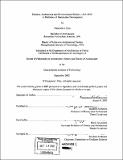Ekistics, architecture and environmental politics, 1945-1976 : a prehistory of sustainable development by Panayiota I. Pyla.
Author(s)
Pyla, Panayiota Ioanni
DownloadFull printable version (29.20Mb)
Other Contributors
Massachusetts Institute of Technology. Dept. of Architecture.
Advisor
Sanford Anderson and Mark Jarzombek.
Terms of use
Metadata
Show full item recordAbstract
The dissertation examines Ekistics, a field defined by the architect and planner Constantine Doxiadis as the "science of human settlements" that championed the radical expansion of architecture's scope, called for its alignment with international development, and emphasized the profession's responsibilities towards global environmental exigencies. Spanning the disciplines of architectural history, environmental history, and cultural studies, the study analyzes the intellectual lineage of Ekistics' conceptions of the global environment, and the complex historical circumstances in which they were shaped: international policies for development, postcolonial agendas of modernization and nation building, scientific controversies on global interconnectedness, and architectural critiques of modernism. The study focuses on Ekistics' planning models of "dynapolis" and "ecumenopolis," and on physical interventions proposed by branches of Doxiadis's enterprise in the Mediterranean margins of Europe and the Middle East, where Ekistics had widespread appeal. The study also analyzes Doxiadis's relationship with key figures in postwar architectural culture, notably Jaqueline Tyrwhitt, who was also the editor of the journal Ekistics, Buckminster Fuller, who embraced Doxiadis's vision of world cities, and Hassan Fathy, who operated as a proponent of local "traditions" in the midst of the Ekistics group. (cont.) Furthermore, the study examines Doxiadis's and his colleagues' interpretation of such concepts as Patrick Geddes's notion of an interconnected "environment," Conrad H. Waddington's notion of "systems," Jean Gottman's notion of "megalopolis," and Rachel Carson's notion of an ecological "balance." By proposing an alternative focus on Ekistics, which for the first time examines the environmental themes underlying its transnational practice, the study fills a gap in current scholarship, by uncovering the profound impact of 1950s and 60s environmental consciousness on architectural culture, before the popularization of environmentalism in the 1970s. Furthermore, it contemplates the extent to which postwar environmental consciousness in architecture is entangled with postwar modernization and development discourses directed at the so-called third world. In the process, the study suggests that the history of postwar environment-development politics can also provide a fresh critical perspective on today's popular topic of sustainability.
Description
Thesis (Ph. D.)--Massachusetts Institute of Technology, Dept. of Architecture, 2002. Includes bibliographical references (p. 155-157).
Date issued
2002Department
Massachusetts Institute of Technology. Department of ArchitecturePublisher
Massachusetts Institute of Technology
Keywords
Architecture.